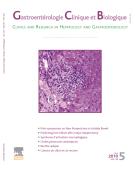Colorectal cancer with non-resectable synchronous metastases: should the primary tumor be resected? - 29/02/08
Pierre Michel [1],
Isabelle Roque [1],
Frédéric Di Fiore [1],
Sophie Langlois [1],
Michel Scotte [2],
Paul Tenière [2],
Bernard Paillot [1]
Mostrare le affiliazioniMétastases synchrones non résécables d'origine colorectale : faut-il systématiquement réséquer la tumeur primitive ? |
Objectif |
Le bénéfice de la résection de la tumeur primitive colorectale n'est pas connu chez les malades asymptomatiques ayant des métastases synchrones non résécables. Le but de cette étude a été d'évaluer l'évolution après résection initale ou non résection de la tumeur primitive colorectale.
Méthodes |
Les données de 54 malades consécutifs ayant des métastases hépatiques synchrones d'un cancer colorectal, pris en charge au CHU de Rouen entre le 1/6/1996 et le 31/12/1999, ont été revues et réparties en deux groupes : groupe 1 : (n = 31) ; malades opérés de première intention, groupe 2 (n = 23) : malades non opérés de première intention. La nécessité de recourir dans un second temps à une chirurgie de la tumeur primitive a été évaluée dans le groupe 2. La survie des 2 groupes a été comparée.
Résultats |
Au cours du suivi, 5 malades du groupe 2 (21,7 %, intervalle de confiance à 95 %-IC95 % 4,9-38,5 %) ont été opérés pour un syndrome occlusif. Les différences significatives entre les groupes 1 et 2 étaient respectivement la localisation rectale (9,7 % versus 34,7 % ; P = 0,03) et le nombre de métastases inférieur à 3 (29,0 % versus 4,3 % ; P = 0,03). Les courbes de survie (Log-Rank) n'étaient pas significativement différentes entre les 2 groupes. La médiane de survie était respectivement de 21 et 14 mois dans les groupes 1 et 2 (P = 0,718).
Conclusion |
La non résection de la tumeur colorectale primitive est une attitude possible chez les malades ayant des métastases synchrones non résécables, sans symptôme colique. L'organisation d'une étude prospective randomisée est justifiée.
Objectives |
In asymptomatic patients presenting with non-resectable synchronous metastatic disease from colorectal adenocarcinoma, the beneficial effect of resecting the primary tumor remains to be documented. The aim of this study was to compare survival of patients with metastatic colorectal cancer who underwent elective resection of the primary tumor to those who did not.
Methods |
A retrospective analysis of patients with metastatic colo-rectal cancer treated between June, 1996 and December, 1999 was performed. Overall survival was compared between patients who underwent first-line resection of the primary colorectal tumor (group 1) or those who did not undergo elective resection of the primary (group 2). The probability of surgical resection of the primary tumor for gastrointestinal complications in group 2 was evaluated.
Results |
Thirty-one and 23 patients were included in groups 1 and 2 respectively. Five patients (21.7%, 95% confidence interval CI95% 4.9-38.5%) in group 2 required surgical treatment for intestinal obstruction due to the primary tumor. Two clinical characteristics were significantly different between groups 1 and 2: rectal localization (9.7% versus 34.7%; P = 0.03) and presence of fewer than three metastases (29.0% versus 4.3%; P = 0.03). Survival curves were not significantly different (logrank). Median duration of survival was 21 and 14 months, respectively (P = 0.718).
Conclusion |
In patients with non-resectable synchronous metastatic disease, non-surgical management of the primary tumor is a rational alternative if asymptomatic. A prospective randomized trial integrating the quality-of-life factor should be organized.
Mappa
© 2004 Elsevier Masson SAS. Tous droits réservés.
Vol 28 - N° 5
P. 434-437 - Maggio 2004 Ritorno al numeroBenvenuto su EM|consulte, il riferimento dei professionisti della salute.

